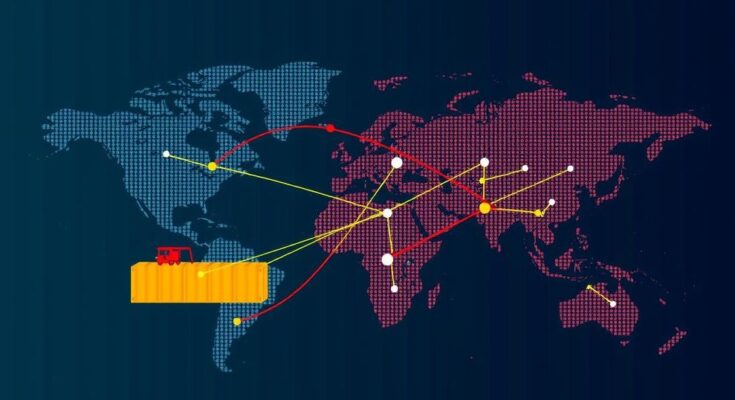President-elect Donald Trump has announced the implementation of tariffs on Canada, Mexico, and China, which could lead to trade wars and significantly affect several sectors including automotive, electronics, and retail. Major companies operating in these regions may have to reconsider their production and sourcing strategies in response to these tariffs, affecting exports and overall market dynamics.
President-elect Donald Trump’s proposed tariffs on Canada, Mexico, and China, which he announced in late November, are set to potentially create significant economic disruptions as these nations are the United States’ primary trading partners. The automotive sector, including manufacturers like Audi, BMW, and Toyota, may be particularly affected due to their extensive operations in Mexico and reliance on exports to the United States. Other sectors like electronics, agriculture, and retail are also anticipated to feel the pinch, as companies adapt their supply chains and production strategies to mitigate the anticipated impacts of these tariffs.
Manufacturers including Nissan, Mazda, and Stellantis operate major assembly plants in Mexico, producing vehicles largely for export to the U.S. market. A significant portion of their output, such as Honda’s 80% and Toyota’s more than 230,000 Tacoma pickups annually, heavily integrates into the American automotive landscape. Companies like Autoliv and Michelin, along with electronics giants Foxconn and Samsung, are similarly vulnerable due to manufacturing sites in Mexico that supply U.S. markets.
Retailers, particularly in the fast fashion and packaged goods sectors, are bracing for tariff repercussions as well. H&M and Five Below are reassessing their sourcing strategies, with a notable reliance on Chinese suppliers identified. Major consumer goods companies like Procter & Gamble and Unilever stand to be affected as approximately 10% and 2% of their shipments, respectively, originate from Mexico. As such, firms are rapidly considering their operational adjustments amid potential tariff whirlwinds, emphasizing their integrated global supply chains.
The backdrop of this discussion centers on President-elect Donald Trump’s commitment to imposing tariffs on key U.S. trading partners – Canada, Mexico, and China. The consequences of these tariffs extend far beyond simple pricing adjustments; they threaten to invoke trade wars that could disrupt the economic status quo. The automotive sector is prominently in the crosshairs given its high volume of cross-border trade with Mexico. Companies have invested billions into Mexican manufacturing to leverage competitive production costs, thereby tying their operational stability to this trade relationship. Concerningly, manufacturers and suppliers in electronics, food and drink, and packaged goods also face uncertainty as they navigate the implications of these tariffs on their import strategies and supply chains.
In conclusion, Trump’s proposed tariffs present a multifaceted challenge to various industries, especially those heavily reliant on trade with Mexico. The automotive sector, which comprises a significant number of affected automakers, could see production adjustments and cost hikes. Retailers and producers in electronics and packaged goods are also poised for disruptions as they reevaluate their sourcing strategies. The overarching theme remains the potential for trade wars that may catalyze adverse economic conditions, prompting companies to act swiftly to safeguard their interests.
Original Source: www.business-standard.com




